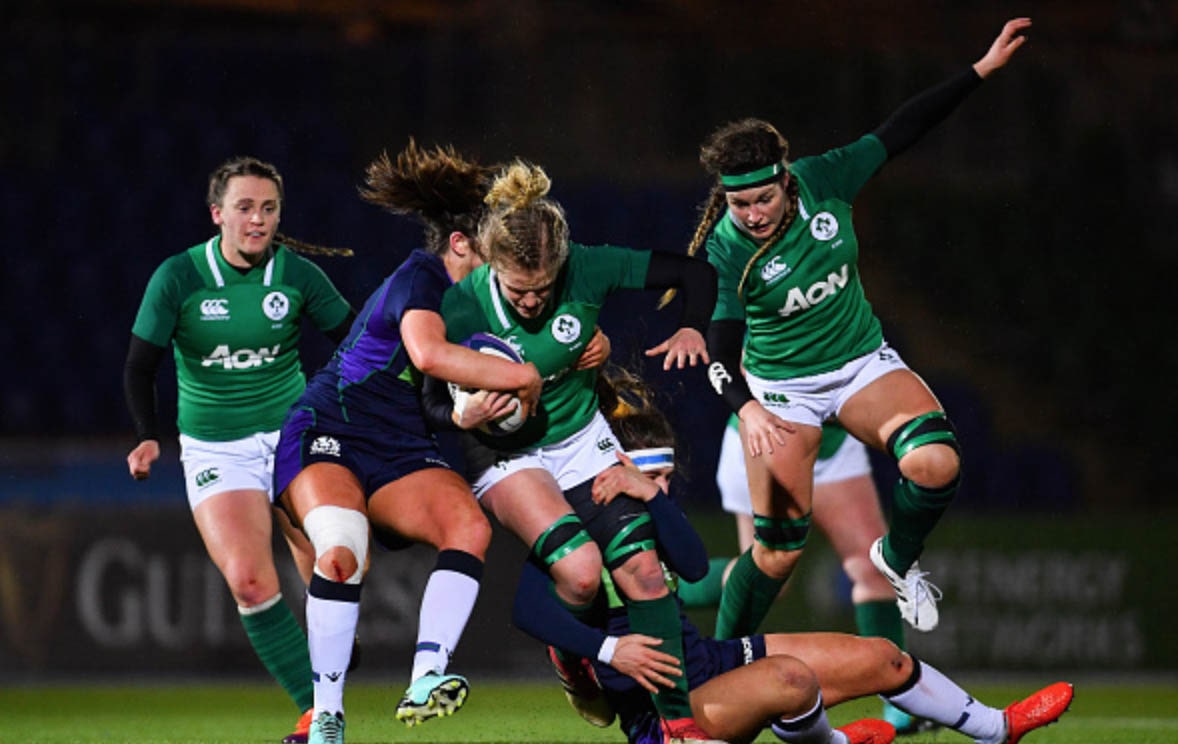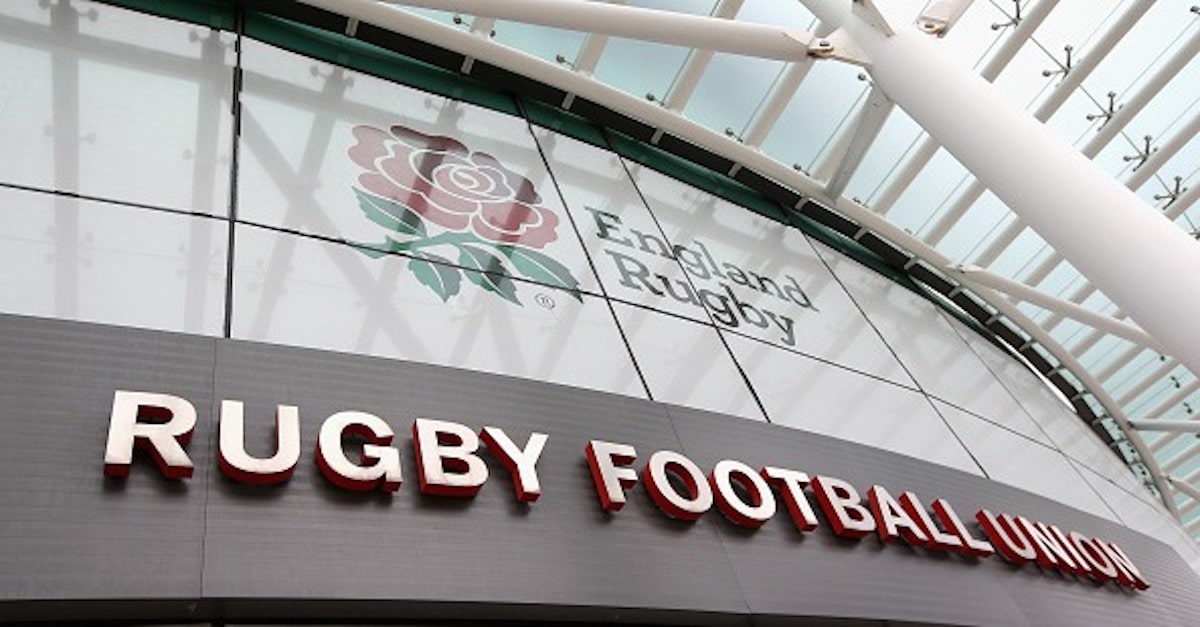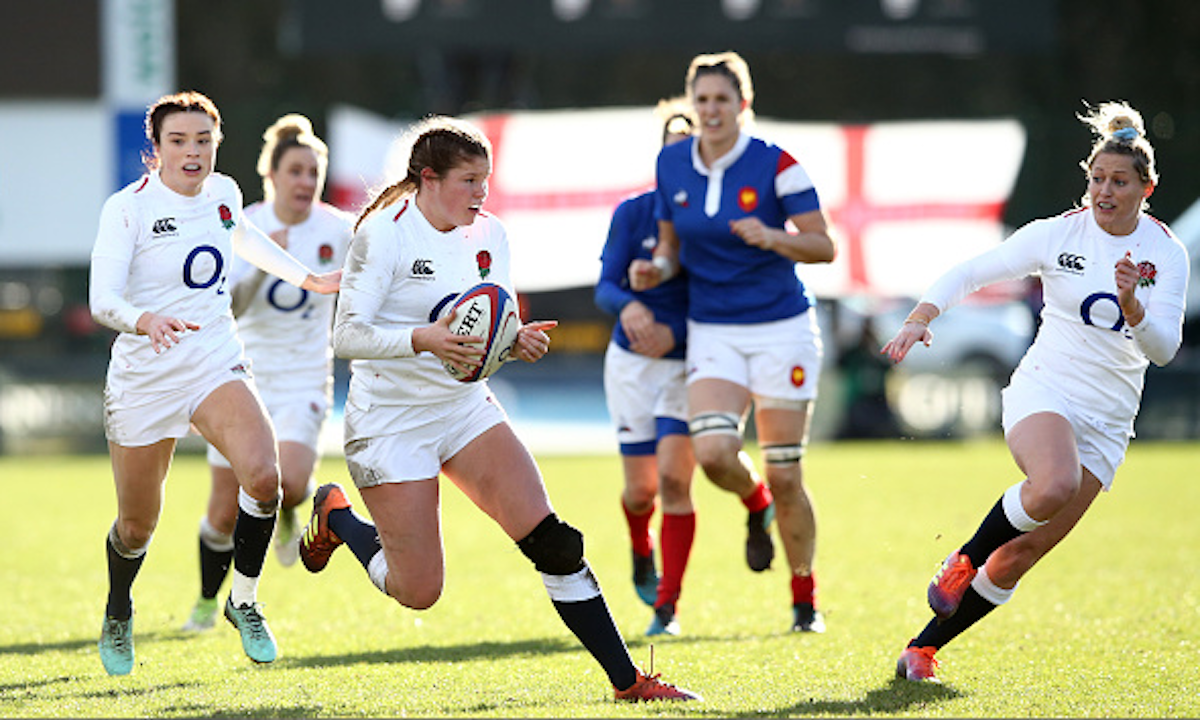Womens Rugby
Ireland Women See Off Scots
Ireland’s women’s team bounced back from last weekend’s defeat to England with victory over Scotland

Ireland’s women’s team returned to winning ways on Friday night with a 22-5 win over their Scottish counterparts in Scotstoun.
#WomensSixNations
— Irish Rugby (@IrishRugby) February 8, 2019
Full Time
Scotstoun – Scotland 5- 22Ireland #ShoulderToShoulder#SCOvIRE pic.twitter.com/z2XBFvepQn
With both teams losing in the opening round, a win for either was essential, with Ireland starting the better on a wet and windy night.
Some early pressure led to a brilliant move across the pitch from left to right, with some quick hands sending Aoife McDermott barrelling over for the games opening try.
6' Scotland 0-5 Ireland – Try for Ireland! Aoife McDermott gets over and it's a great start for the visitors https://t.co/RINh3G8FyW #RTErugby pic.twitter.com/ONPOOCmHmI
— RTÉ Rugby (@RTErugby) February 8, 2019
The conversion was missed by Nicole Fowley leaving the score at 5-0 in the opening five minutes.
After 10 minutes Ireland had managed 70% of the possession, but it made little difference as Scotland drew level on 20 minutes.
They won a penalty under the posts but decided to go for a scrum rather than three points. The risk paid off as centre Hannah Smith showed some great pace to slip through the Irish defence and tie the score.
20' Scotland 5-5 Ireland – Hannah Smith skates over for a Scottish try after a sustained period of pressure https://t.co/RINh3G8FyW #RTErugby pic.twitter.com/eYxHKuqMpO
— RTÉ Rugby (@RTErugby) February 8, 2019
The conversion was missed but the score remained at 5-5 up until the 41st minute.
Following a dart forward from Anna Caplice, Ireland went through the phases before Leah Lyons touched down over the whitewash, with the conversion missed once more leaving the score at 10-5 at half-time.
Leah Lyons' try on the stroke of half-time has Ireland 10-5 ahead in Scotland. Follow the second half right here https://t.co/RINh3G8FyW #RTErugby pic.twitter.com/H4uJ27tL2E
— RTÉ Rugby (@RTErugby) February 8, 2019
WOMEN | HT | After a long period of possession, Ireland score on the half-time whistle to just take the lead here at Scotstoun.
— Scottish Rugby (@Scotlandteam) February 8, 2019
??????? (5-10) ☘️ #SCOWOMEN pic.twitter.com/1rwiquAvnE
Once more, Ireland came out of the blocks quickly in the second-half and five minutes in they were five points further ahead.
With pressure sustained from the kick-off, Ireland found themselves camped in the Scottish 22, until through some fortunate passing they found a fit again Alison Miller, who slide in for try number three.
It's Ali Miller! Ireland score their third try to move 15-5 ahead in Scotland https://t.co/RINh3G8FyW #RTErugby pic.twitter.com/mh7UerJSO2
— RTÉ Rugby (@RTErugby) February 8, 2019
The extra two points were missed again as it remained 15-5.
Ireland continued to show more than their hosts in attack and eventually they secured the bonus-point.
Scotland had a scrum near their 22 which Ireland won against the head and built up the phases there after. Some beautiful hands in the horrific conditions was rounded off with player of the match Anna Caplice getting over for the try.
There's the bonus! Anna Caplice makes it 22-5 to Ireland against Scotland as Fowley converts https://t.co/RINh3G8FyW #RTErugby pic.twitter.com/oyiE0FcaaD
— RTÉ Rugby (@RTErugby) February 8, 2019
This time Fowley put the ball between the sticks, and it was 22-5.
The remainder of the game was plagued by handling errors and confusion with neither team showing much urgency with the match already out of Scotland’s hands.
For Ireland the positives in the closing stages were that they brought on Claire Boles and Deirbhile Nic a Bhaird for their debuts and held on for their opening win in this year’s championship.
The win moves Ireland up to fourth in the standings and gives them plenty of encouragement heading into their game against Italy in two weeks’ time.
Scotland on the other hand are in fifth with two losses out of two and face a high-flying French side next.
Premiership
RFU announce Premier 15s tender process

By Emily Liles
25/8/22
The Rugby Football Union have today announced that the new Premier 15s league is now entering the next stage in its tender process with the issue of the Request for Proposals (RFP) on Monday, September 5.
The RFP will be issued to all clubs who formally responded to the Expression of Interest, which closed on Friday 12th August 2022 and the deadline for the submission of responses to the RFP is 28th October 2022 at 1700.
Alex Teasdale, head of women’s game at the RFU commented: “This is a really exciting phase of development for the next cycle of the Premier 15s league. All clubs who responded to the formal Expression of Interest will now set out their approach for the next cycle of Premier 15s and provide further detail around how their club will deliver against the criteria as set out in the RFP and support the delivery of a progressive league both on and off the pitch.
“Within the RFP there is an option for those responding clubs to meet with the RFU during September and October to discuss the process and any queries they have regarding this stage. We are looking forward to receiving the responses to the RFP and progressing the development plans to ensure we deliver a robust platform and ensure the next cycle of the Premier 15s continues to grow the sport at every level.”
By 22nd November 2022 a Selection Panel, comprised of representatives of the RFU and sport specialists independent of clubs involved in the process, will evaluate all the responses to the RFP and subsequently create a shortlist of clubs. Those shortlisted clubs will then present their approach for the Premier 15s to the Selection Panel at agreed times between 28th November and 7th December.
Subject to any appeals, all shortlisted clubs will be notified of the Selection Panel’s decision on the inclusion of clubs in the next cycle of the Premier 15s by the end of December this year.
An announcement will be made in Spring 2023 celebrating the successful clubs who will compete in the Allianz Premier 15s from the 2023/24 season.
The timeline for the next stage of development is listed below:
5th September 2022: RFPs issued to interested clubs
September – October 2022: Opportunity for interested clubs to meet with RFU
1700 hours, 28th October 2022: Deadline for responses to RFP
By 22nd November 2022: Selection panel will have evaluated RFP responses and a shortlist of clubs created
Between 28th November and 7th December 2022: Shortlisted clubs to present responses to RFP to Selection Panel
End December 2022: All shortlisted clubs notified of Selection Panel results, subject to appeals
Spring 2023: Participation agreements issued to successful applicants
International
RFU Council votes in favour of change to gender participation policy

| Press release issued by Rugby Football Union |
- The RFU Council has approved a new gender participation policy following extensive stakeholder consultation and thorough review of all available scientific evidence
- New policy takes a precautionary approach by prioritising safety of players
- RFU promoting opportunities for everyone to participate in rugby offering a range of formats and ways to get involved along with a confidential helpline
- RFU committed to working with World Rugby and UK Sports Councils to ensure further research is conducted and to reviewing the policy on a regular basis
Following an extensive RFU consultation, the RFU Council has voted in favour of updating its gender participation policy for rugby in England from the start of the 2022/23 season with 33 in favour, 26 against and 2 abstaining.
The RFU began a detailed review of its policy in Autumn 2020, this included a game wide survey receiving over 11,000 responses, extensive consultation with and listening to a wide range of independent experts as well as considering all available scientific evidence along with liaising with other sporting bodies.
The review and consultation concluded that detailed peer reviewed research provides evidence that there are physical differences between those people whose sex originally recorded as male and those as female at birth, and advantages in strength, stamina and physique brought about by testosterone and male puberty are significant and retained even after testosterone suppression.
This science provides the basis of the new gender participation policy that concludes the inclusion of trans people originally recorded male at birth in female contact rugby cannot be balanced against considerations of safety and fairness.
The RFU Council has determined that until such time as new further peer-reviewed science is available, a precautionary approach is appropriate to ensure fair competition and safety of all competitors. Therefore, the RFU Council approved a policy change to only permit players in the female category if the sex originally recorded at birth is female.
The RFU recognises this was a complex and difficult decision and the policy change was not taken lightly or without thorough and full research and consultation. Speaking about the decision, RFU President, His Honour Jeff Blackett said: “I would like to thank everyone for the passion, time and effort that has been put in to consulting with us and informing this policy review. Inclusion is at the heart of rugby values and we will continue to work with everyone to keep listening, learning and finding ways to demonstrate there is a place for everyone in our game. We know that many will be disappointed by this decision however, it has been based on all the scientific evidence available. Our game can be strengthened by everyone who is involved; be it in coaching, refereeing, administration or supporting and playing non-contact forms of the game.”
The RFU also considered the merits of a case-by-case assessment process, but in light of the research findings and work of World Rugby and the UK Sports Councils, and given the difficulties in identifying a credible test to assess physiological variables, this is no longer a viable option at this time and does not necessarily ensure inclusion. World Rugby has a dedicated funding stream for research in this area and the RFU will continue to work with World Rugby and other stakeholders in promoting research to continue.
In the male category, players whose sex recorded at birth is female may play if they provide their written consent and a risk assessment is carried out.
The RFU is committed to supporting and encouraging opportunities for everyone to participate in rugby including non-contact formats of the game and through coaching, refereeing or volunteering roles. If anyone would like to find out more about how rugby can be inclusive to them and would like to get involved they can contact the RFU via genderparticipation@rfu.com . For anyone who wants advice on mental-wellbeing please see this link.
The RFU has contacted the registered trans women players, who the revised policy has a direct impact on, to offer its support in continuing to encourage them to participate in the sport. The RFU will continue to listen and review its policy on a regular basis and welcomes all new research on this subject to inform these reviews.
For further information on the review please click here:
RFU Gender Participation Policy – frequently asked questions
RFU Gender Participation video
6 Nations
Women’s Six Nations 2022 schedule revealed

- All matches to be shown in the UK, Ireland and Italy
- The Women’s Six Nations remains in its own dedicated window in the calendar in March and April
- The introduction of ‘Super Saturday’ on April 30 is set to become a key highlight of the women’s rugby calendar
Fans are set to enjoy a greatly enhanced Women’s Six Nations in 2022 thanks to a massive increase in coverage on broadcast networks in the UK, Ireland and Italy and a confirmed stand-alone slot in the calendar.
The 2022 Championship will see all 15 matches broadcast on BBC in the UK, RTÉ and Virgin Media in Ireland and Sky Italia for the Italian market. Details for France will be communicated in due course.
Matches will be shown on a mix of terrestrial and Player services with broadcasters across territories significantly increasing their commitment to the women’s game.
Changes to the Women’s Six Nations window in 2021 proved a major success with high viewing figures and increased digital engagement indicating confirming that a new slot in the calendar can play a significant role in driving the growth of the women’s game.
The 2022 matches will also be played in a six-week window in late March and April, breaking the traditional link to the men’s calendar.

Scotland will open the Championship against 2021 champions England at DAM Health Stadium on 26th March, while Ireland will take on Wales at the RDS Arena on the same day.
Round 2 will take place on 2nd and 3rd April with Wales hosting Scotland at the Cardiff Arms Park while Ireland will travel to France on Saturday 2nd April. Meanwhile, England will travel to Italy for their game on Sunday 3rd April.
The third round will see England host Wales on Saturday 9th April with the other two matches taking place on Sunday 10th April when Scotland will host France and Italy will travel to Cork.
After a break weekend, Round 4 will start on Friday 22nd April in Cardiff with Wales v France. Italy v Scotland will be on Saturday 23rd and England will host Ireland on Sunday 24th April.
The Championship will end with a Super Saturday as Wales v Italy, Ireland v Scotland and France v England take place on the same day.
Six Nations CEO Ben Morel commented: “Increased visibility is key for the growth of the women’s game. We are delighted to have enhanced broadcast partnerships in place along with a continuation of the dedicated window from which we saw such success last year.
“These two key developments along with continued investment in many other areas including performance, commercial and marketing will enhance the Women’s Six Nations for fans and players alike.”













